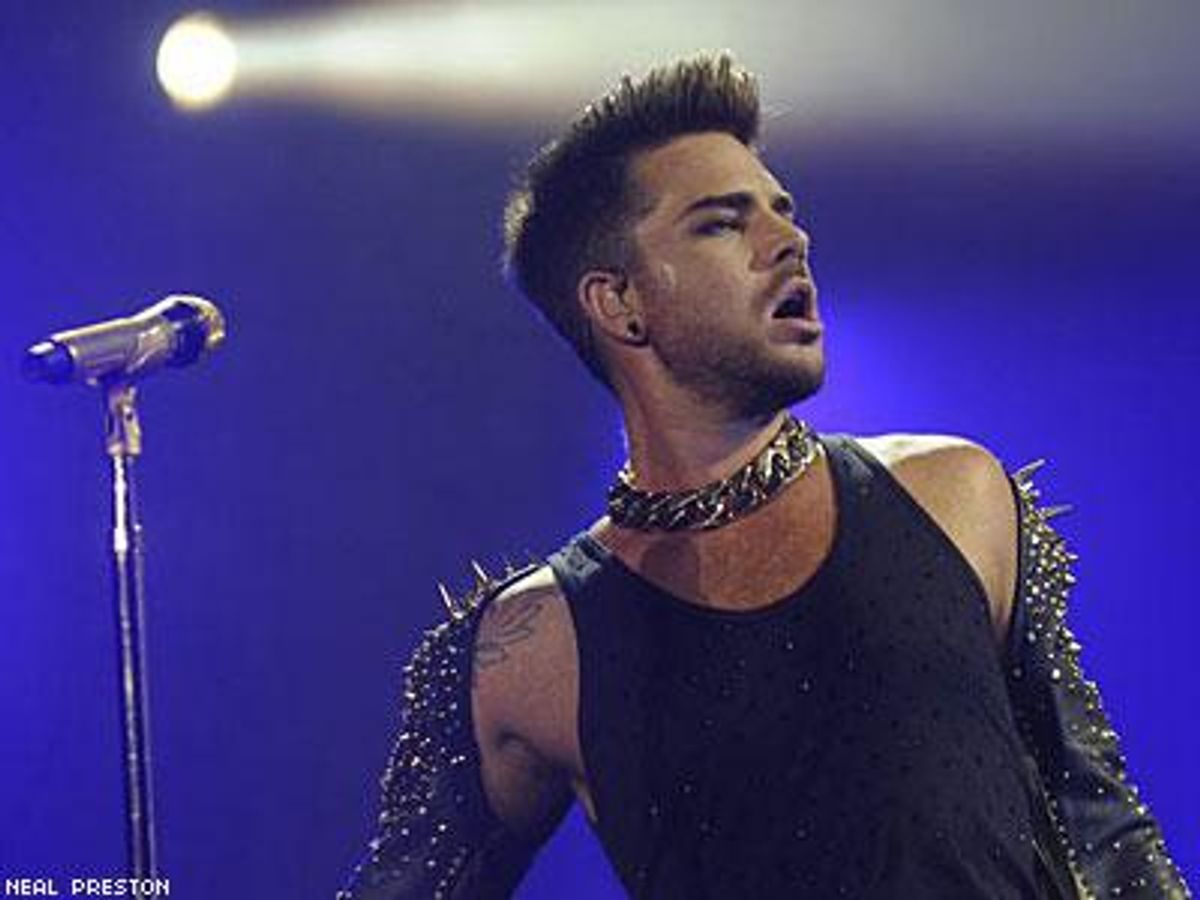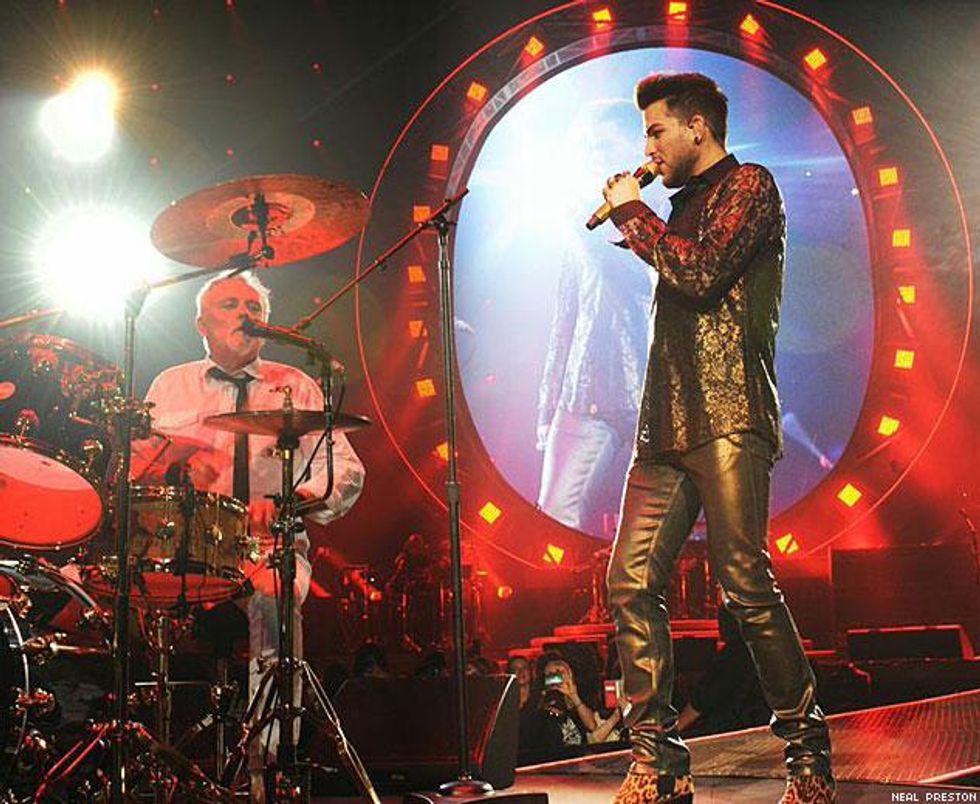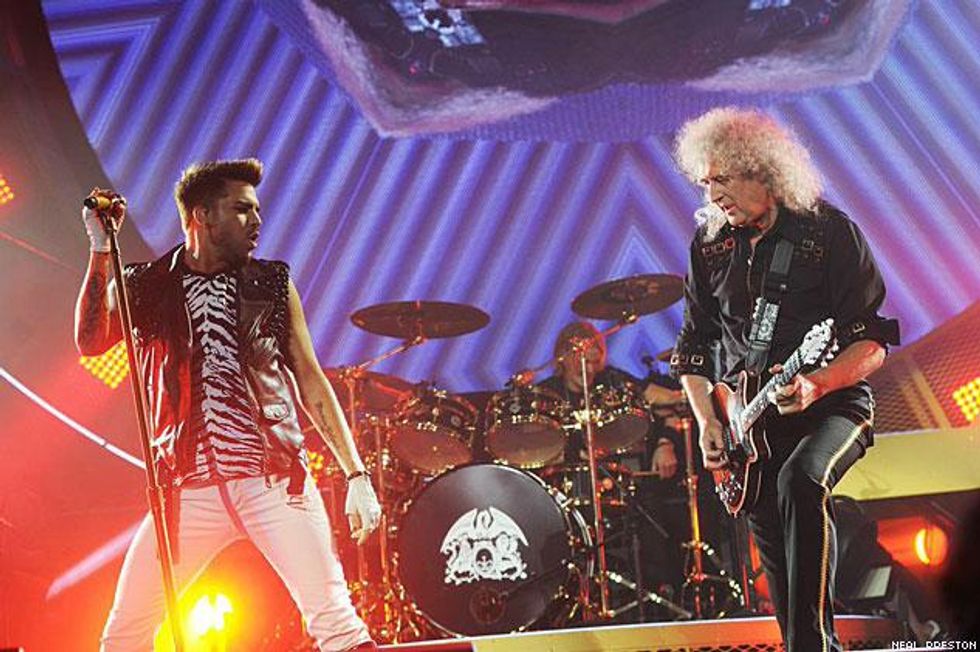At a recent performance of the song "Killer Queen" at Queen + Adam Lambert, a national tour of the storied rock band alongside the American Idol alumnus, Lambert reclines upon a red-velvet divan in front of a packed audience of both Queen diehards and his own younger fanbase. Sporting a spiked and tasseled leather jacket as well as his signature eyeliner, the singer takes a swig of champagne from the bottle, before spitting it back out at the cheering crowd. It's a rock star move, and Lambert, 32, who enthralled stages in 24 North American cities this summer by channeling the band's late frontman Freddie Mercury, has emerged as a star in his own right.
In the five years since he auditioned for Idol with "Bohemian Rhapsody," he has made history by becoming the first out pop artist whose album topped the Billboard 100 chart. In many respects, he is a natural fit for the throne of Queen, whose lead singer's flamboyant stage persona inspired a generation and paved the way for musicians like Lambert.
But for the "Whataya Want From Me" singer, it has not been an easy task sliding into Mercury's black-diamond-print spandex. The tour, which ran June 19 through July 28, has been a balancing act between paying respect to Mercury's music and being true to his own brand.
"I'm Adam onstage. I'm not playing Freddie," Lambert notes en route to one of his final North American performances with Queen. "I'm not trying to be him. However, he's so amazing. His recordings and his performances were so incredible that I can't help but be inspired by them. And on a technical level, I don't want to move too far away from the music that they've created, but I do want to put my own stamp on everything."
"It's a huge challenge as well, because there's been a lot of expectation and doubt," he adds. "You have a mix of people in the audience that are diehard Queen fans, and I have my fans that are coming to the show kind of through me. It's interesting bringing them all together and seeing how it all plays out."
The experience of singing classics like "Killer Queen," "Bohemian Rhapsody," and more onstage has been "thrilling," says Lambert, in part due to the audience's reaction, which has been nothing less than enthusiastic.
"Getting to sing these iconic pieces of music, it's really exciting to get people singing along, and dancing, and clapping," he says. "Doing newer stuff that's not super well known--it's a different type of show."
Lambert was first introduced to the oeuvre of Queen when he was about 10 years old through a viewing of Wayne's World, when the main characters played by Mike Myers and Dana Carvey sing along to a car radio rendition of "Bohemian Rhapsody" during the opening credits. After the film, he asked for the name of the band from his father, who responded, "Oh! That's Queen!" and proceeded to share with Lambert some of the British rock band's albums in his collection.
It wasn't until about 10 years later that Lambert really dove into his love affair with Queen and other rock music from the '70s. The stage performances of Mercury, in particular, made an indelible impression.
"I remember seeing some footage of him and thinking, 'Wow, this guy is on fire! What an amazing performer!'" recalls Lambert, whose stage presence throughout his tenure at American Idol was praised with comparisons to Mercury. In fact, a memorable televised performance alongside Queen on the popular Fox reality competition foreshadowed their current collaboration.
But Lambert did not learn of Mercury's sexual orientation until after he had become a fan, an experience not unusual to listeners of one of the world's best-selling music groups, whose songs like "We Will Rock You" and "We Are the Champions" are anthems at sports stadiums around the world. While this knowledge "perked me up, because I thought, Oh wow, this is somebody that was a real huge star and an icon in rock and roll," Lambert is also pleased that Mercury's sexuality remains a side note in the overall life soundtrack of one of music's greats.
"It doesn't have to matter whether you're gay, straight, bi, black, white, whatever, man, woman. That's not the point. That's not the thing that's bringing us together. The thing that's bringing us together is music," Lambert says. "[We're] entering a period of time now where we're getting towards that post-gay sensibility, which is, so what? But it took a lot of fighting to get there."

Although easy parallels can be drawn between the lives of Mercury and Lambert, the two musicians have had vastly different experiences as queer men due to their respective generations. An intensely private man, Mercury, who was born in 1946 in Tanzania, rarely gave interviews, though the media would often freely speculate about his sexual orientation due to his flashy performances and rumors of affairs with men. He identified as bisexual to friends as well as his longtime partner Mary Austin, to whom he would leave his estate. After years of whispers that he had contracted HIV due to deterioration in his health and appearance, Mercury announced that he had the virus at the age of 45. He died less than two days afterward due to an AIDS-related illness.
Lambert, on the other hand, says he has been out since the age of 18, though his sexual orientation was not public knowledge until after photos of him kissing another man surfaced during his rise to fame on season 8 of American Idol. A standout of his season, he would eventually place runner-up to Kris Allen, and many have speculated whether his sexuality may have factored into his not winning the competition, which is voted on by viewers from across the country. Despite the slight, Lambert went on to enjoy critical and commercial success and is still one of the most recognizable names from the Idol franchise. Along the way, he was also able to find a community of support from other out musicians.
"I definitely struck up some friendships with some out musicians that I really respect: Jake Shears from the Scissor Sisters, Sam Sparro. I got to meet Sam Smith in London. He was wonderful. I definitely think there is a certain fraternity there," he says.
Despite these accomplishments and the advances in LGBT equality that have taken place since Mercury's heyday, Lambert acknowledges that there are still systemic challenges to being gay in the music industry, which ultimately boil down to marketability. Executives still question if out musicians can sell records, particularly if one is a solo musician and not a part of a band. The burden of carrying a brand by oneself presents difficulties that are unique even from homophobic bastions like the sports arena, Lambert admits.
"The music business is tough I think, because the artist is directly related to the sales," he says. "In sports, it's this player plays for this team, and how many players are on the team with that player? It's a group thing. It's a group effort. So it's a different kind of bearing on the business side of it."

"It's tough with music," Lambert continues. "It's similar to actors, and so many of them wanting to be in the closet, because they don't want to affect their business. They don't want to have an uphill battle with the characters they're trying to create. It's a shame, because I wish it was different, but it's just kind of the reality."
This reality is illustrated in the music videos of big-name gay artists like Lambert or even Elton John, in which portrayals of same-sex relationships or even a kiss is visibly lacking. Nevertheless, Lambert has notably pushed the boundaries of these unspoken rules. In 2009 he memorably kissed his male keyboard player onstage at the American Music Awards, making headlines and shocking U.S. audiences.
"You have to make a choice: do I want to be this for the cause, or do I want to be able to run my business a certain way? It's difficult. It's really difficult," he says. "But everybody's different and for me, personally, my journey has been, the minute I was able to discuss my personal life after Idol, I immediately discussed it, because I wanted to be out and open. That's the kind of person I am, and that's the statement I wanted to make. But it hasn't been without its challenges."
Even as the industry continues to close doors on many out musicians, Lambert attests to a noticeable shift to what he terms a "post-gay place." He maintains that younger generations do not share the stigmas that were more prevalent in Mercury's day and they refuse to be pigeonholed with labels on their identities.
"This next generation coming up is like, 'Hey, it doesn't fucking matter... My sexuality, doesn't [determine that] this is the type of music I listen to, or this is the type of activities I'm into, or these are the type of people I hang out with. It's getting to the point now where we're more mainstream, and we're allowed to do anything we want, and we're allowed to be with anybody we want,'" Lambert says. "So there's not as much segregation... and I think that's really exciting, because I don't think it should matter."
In order to continue pushing for expanding this space for the LGBT community and beyond, Lambert is serving for the second year in a row as spokesperson for AT&T's "Live Proud" campaign. The initiative encourages all people - regardless of sexual orientation - to share memes illustrating their pride through social media channels. Five lucky participants in the campaign, which ends August 10, will have the chance to attend a private event with Lambert in New York. The goal, he says, is "empowerment," and to give others "a voice to be what and who they are."
In many ways, this message echoes the lessons Lambert learned from singing the words of one of his own idols during his tour with Queen.
"I feel like it's one of the things that I respect about him a lot. He never really made any apologies for anything," Lambert says of Freddie Mercury. "He just was who he was. And if there's something I can take from that, it's that sometimes, especially in today's world, where we're at, there's such a strong statement in just boldly being what and who you are."
"We're finally entering a place in music where [sexuality] is an afterthought. It's a very exciting time," Lambert concludes, adding a Simon Cowell-esque caveat for aspiring gay musicians: "As long as the music's good!"



















































































Viral post saying Republicans 'have two daddies now' has MAGA hot and bothered